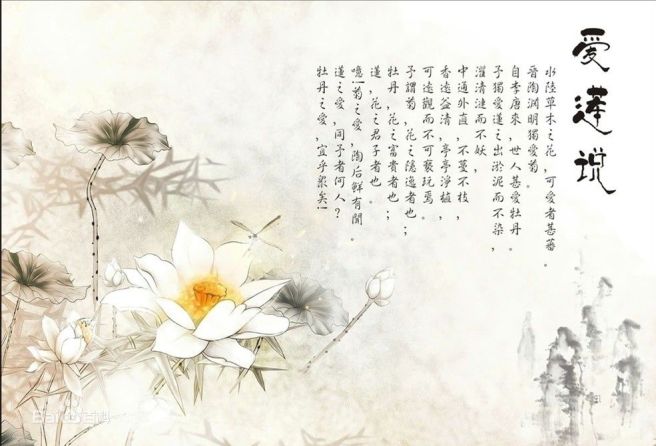*text mentioned in Jiang Hu Road Is Curved chapter seven.

{{On the Love of the Lotus}}
Many flowers of grasses and trees in the water and on the land
Are worthy of admiration.
Tao Yuan Ming[1] of Jin dynasty only loved the chrysanthemum;
Since Tang Dynasty, all people have deeply loved the peonies[2].
But I only love the lotus, which came out of mud yet is not contaminated,
Washed by ripples yet is not voluptuous,
Its straight stem is hollow inside,
It does not grow into branches or vines,
Its clean fragrance diffuses a far distance,
It stands there perfectly upright and clean,
It shall only be admired from afar instead of being played in people’s hands.
–
I think the chrysanthemum is the recluse of the flowers;
Peony is the nobility of great wealth;
Lotus is the gentleman of the flowers.
Alas!
The love of chrysanthemum is seldom seen after Tao Yuan Ming,
Who else share the same love of Lotus that I have?
The love of peonies is of course widespread everywhere.
–
[1] Táo yuān míng/ 陶渊明 is an important poet and writer in Chinese literature history.
[2]Peony is often considered as the flower of China, symbolizing nobility, wealth and status. Peony is often associated with the empress.
《爱莲说》《Ài Lián Shuō》
水(shuǐ)陆(lù)草(cǎo)木(mù)之(zhī)花(huā),可(kě)爱(ài)者(zhě)甚(shèn)蕃(fān)。
晋(jìn)陶(táo)渊(yuān)明(míng)独(dú)爱(ài)菊(jú)。
自(zì)李(lǐ)唐(táng)来(lái),世(shì)人(rén)甚(shèn)爱(ài)牡(mǔ)丹(dān)。
予(yǔ)独(dú)爱(ài)莲(lián)之(zhī)出(chū)淤(yū)泥(ní)而(ér)不(bù)染(rǎn),
濯(zhuó)清(qīng)涟(lián)而(ér)不(bù)妖(yāo),
中(zhōng)通(tōng)外(wài)直(zhí),
不(bù)蔓(màn)不(bù)枝(zhī),
香(xiāng)远(yuǎn)益(yì)清(qīng),
亭(tíng)亭(tíng)净(jìng)植(zhí),
可(kě)远(yuǎn)观(guān)而(ér)不(bù)可(kě)亵(xiè)玩(wán)焉(yān)。
予(yǔ)谓(wèi)菊(jú),花(huā)之(zhī)隐(yǐn)逸(yì)者(zhě)也(yě);
牡(mǔ)丹(dān),花(huā)之(zhī)富(fù)贵(guì)者(zhě)也(yě);
莲(lián),花(huā)之(zhī)君(jūn)子(zǐ)者(zhě)也(yě)。
噫(yī)!
菊(jú)之(zhī)爱(ài),陶(táo)后(hòu)鲜(xiān)有(yǒu)闻(wén)。
莲(lián)之(zhī)爱(ài),同(tóng)予(yǔ)者(zhě)何(hé)人(rén)?
牡(mǔ)丹(dān)之(zhī)爱(ài),宜(yí)乎(hū)众(zhòng)矣(yǐ)!
Lotus flowers are regarded as noble and clean in traditional Chinese culture. Zhou Dun Yi personified lotus into a gentleman, expressing his belief of being righteous in the dark bureaucracy and the society. This essay is also well known today, being taught in almost all schools. People still use “washed by ripples yet not voluptuous, came out of mud yet not contaminated” to praise individuals with admirable characters.
Thanks to the great influence of the Mary Sue genre, young people’s impression of White Lotus Flowers is totally different from the traditional view of lotus. When you hear the younger generation talking about White Lotus, they are definitely referring to a certain pretending-to-be-innocent girl. Most of the time, White Lotus girls are the female leads in the Mary Sue genre. To get a general idea, imagine the cliché female leads from Korean dramas, who are extremely poor yet attract countless rich guys because of their “kind hearts”. They always get bullied from others yet forgive them every single time, trust even their love-enemies, and believe the world is all kind. They are so unrealistically innocent and stupid to the point that they seem fake.
Hope this will help you to better understand the significance of lotus in traditional Chinese culture and the “White Lotus girls”.
Orignal text and image: http://baike.baidu.com/link?url=jRMWXzzGXu6HRxPiZGSkMQ_sh2TvQtmoJKBEMT1ZA5KLZwydnEzb2hzfO2bkvuVEgHEnmfNc_brxs02aGPMOdtDK1OwZWlmWXgCWEmVM8pO

Thank you so much!! 😘😘😘
LikeLiked by 1 person
Thanks! I heard that my ancestor wrote this, so I was looking for a translation somewhere.
LikeLike
I am more interested in the meaning and translation of the love of Lotus. It is appealing and shows being humble, integrity, and noble. Thank you.
LikeLike